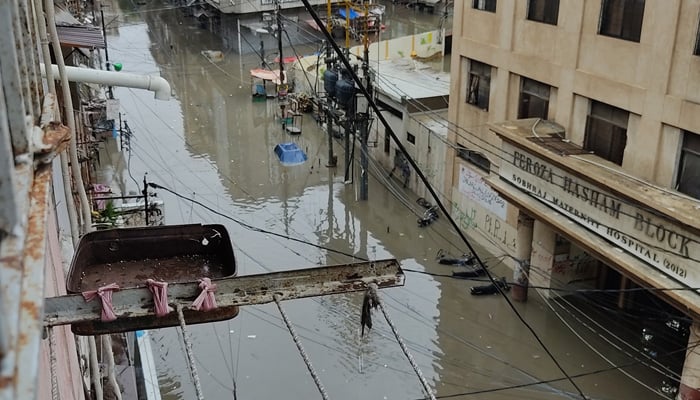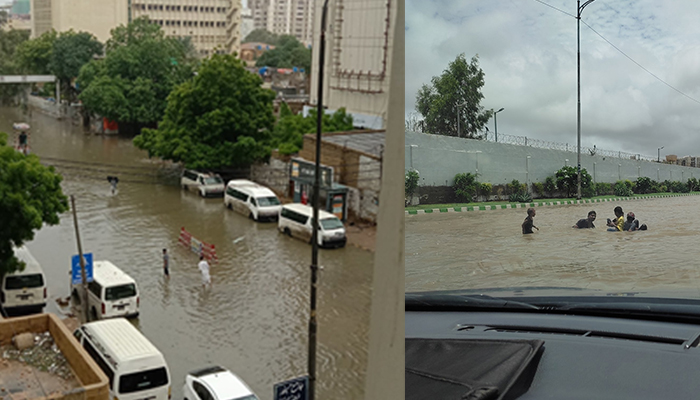5 die as record-breaking rainfall submerges Karachi
PM Shahbaz Sharif speaks to CM Sindh offering help after heavy downpour in metropolis
KARACHI/ISLAMABAD: At least five people lost their lives in different areas of Karachi as record-breaking rainfall submerged the metropolis on Monday ruining Eid festivities.
Speaking to journalists after visiting the city, Sindh Chief Minister Murad Ali Shah rejected criticism that ministers are enjoying Eid in their hometowns and said: “Our ministers are on the roads for relief work.”
“We have received record-breaking in Karachi over the past few days,” the chief minister said, adding that there’s a need to fix the city’s drainage system.
The chief minister blamed encroachments on rainwater drains for urban flooding in Karachi.
PM offers help
Meanwhile, Prime Minister Shabaz Sharif offered help to the Sindh government as monsoon rains pounded Karachi.
The rains that began on the evening of Eid ul Adha’s first day continued to pour till today afternoon, leaving several parts of Karachi submerged and main roads including Shahrah-e-Faisal, Dr Ziauddin Ahemd Road and II Chundrigarh Road inundated.
In light of the devastating situation in Karachi, the premier telephoned the chief minister, expressing grief over the loss of precious lives and offered every possible support to the provincial government.
The prime minister said although he was deeply saddened by the tragic losses due to torrential rains in Karachi, he is confident that the Sindh government will rise to the occasion and bring life back to normal under the able leadership of CM Shah.
The premier also directed the provincial governments and the National Disaster Management Authority (NDMA) for making coordinated efforts to ensure public safety and relocation of the affected people as monsoon rains battered parts of the country.
The prime minister said that all-out efforts should be made to protect the people against losses, instructing the NDMA to join hands with the provincial governments as well as the provincial disaster management authorities.
Calling for relocation of the affected population to safer areas, the prime minister directed the federal government institutions to extend all possible support to the provincial governments and institutions to handle the situation.
An official from the Pakistan Meteorological Department (PMD) said that this year’s monsoon system has caused above-average rainfall in Balochistan, while the monsoon average in Karachi stood at 141mm.
Chief Meteorologist Sardar Sarfraz warned that the effects of climate change were being felt with the severity of the weather — as heavy rains have wreaked havoc in Pakistan.
For Karachi, the chief meteorologist forecast a gloomy picture as he said that the rains were expected to continue for a few hours and the next system will hit the metropolis from July 14-18.
“During the second system, heavy rains are expected.”
Rainfall exposes Sindh govt’s claims
Several main roads and streets were completely flooded in Karachi as heavy rainfall once again exposed the city’s drainage system and the Sindh government’s claims regarding its rain emergency plans.
The city’s posh areas including DHA and Clifton were submerged due to heavy showers where rainwater entered homes with the masses slamming authorities for their negligence that has ruined their Eid.
Meanwhile, in a statement, MQM-P has lashed out at the Sindh government over its “failure” amid continuous heavy rainfall.
“Rains have once again exposed the state of Karachi's infrastructure. The city’s sewerage system is choked with roads giving a view of ponds.”
The MQM-P, a key partner in the Shahbaz Sharif-led coalition government, said citizens are suffering due to the incompetence of the Sindh government.
“Sindh government ministers and officials are celebrating Eid in their home areas.”
Roads closed for traffic
As a result of the torrential rains, several roads in the metropolis were inundated with water and closed for traffic.
In a statement, the Karachi Traffic Police said several feet of water had accumulated on Shahrah-e-Faisal at different points, while Dalmia Road is closed for traffic after it was flooded earlier today.
Several feet of water had accumulated near the Baloch Colony bridge, blocking vehicular movement on the main artery.
Karaz Road too was closed by the police.
The police officials said the traffic at Sher Shah Paracha Chowk has been affected due to the accumulation of water, while the flow of the water at Korangi Causeway Road has increased after overnight showers.
They said that Essa Nagri, NIPA Chowrangi, and Johar Chowrangi were closed for traffic as they were inundated.
Rainfall in 24 hours
According to the PMD data, the highest amount of rainfall was recorded in DHA Phase-II which received 126.6mm of rain.
- PAF Faisal Base 88mm;
- Masroor Base 53mm;
- North Karachi 38mm;
- Old Airport 35.6mm;
- University Road 34mm.
Average monsoon record breaks
The average three-month monsoon rain record in Karachi is 141.4mm rainfall, but this year’s torrential rains have broken it in just a few days. The city’s July average, according to the PMD, is 53.2mm, August 64.6mm, and September 23.6mm rainfall.
However, the metropolis received heavy downfall as Karachi’s Defence Housing Authority (DHA) area recorded the highest rainfall at 233.2mm, Pakistan Air Force Masroor Base 172.5mm, and the airforce’s Faisal Base recorded 153mm rainfall.
Power outages
In a statement, the city’s sole power utility, K-Electric said that the metropolis is being provided with electricity from 1,400 out of 1,900 power feeders as 500 feeders are shut due to the accumulation of water in those places.
The power utility said that the feeders have been switched off “due to safety and technical reasons” and once the water has been drained from the areas, the electricity supply will resume.
It added that Gulshan-e-Iqbal, Surjani, Baldia, Bin Qasim, and the power of some other towns had been affected.
-
Security forces gun down 30 terrorists in multiple IBOs in KP: ISPR
-
MQM-P calls for new province in Sindh
-
US report validates Pakistan military edge over India: PM
-
Banned TTP poses serious threat to Pakistan security: UNSC panel
-
CM Afridi clarifies remarks on by-poll after ECP requests army deployment
-
Dubai sees 3.2m Pakistani passengers in 2025 as airport sets new milestone
-
Security forces kill 23 Indian proxy terrorists in KP's Kurram
-
Pakistan to construct island to boost oil exploration: report













